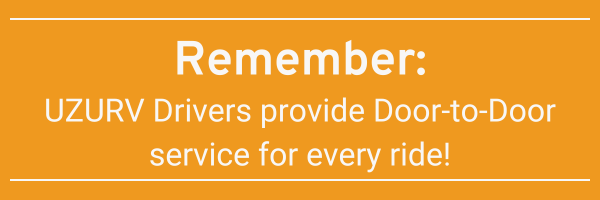Good to Know
04.19.24
Replace Judgment with Curiosity
Serving riders with non-apparent disabilities
UZURV riders have a wide range of abilities, as well as a wide range of disabilities – not all of which are obvious.

UZURV spoke with Michelle Witman, co-founder of Asset Based Consulting, a firm that helps companies and groups remove barriers for people with disabilities.
“We work with organizations of all types to shift company culture so we all understand that everybody has an asset to offer,” Witman said.
Buildings, technology, and transportation are often filled with obstacles for people with disabilities. The Americans with Disabilities Act ensures that communities make reasonable accommodations and modifications so people with disabilities can fully participate.
However, removing obstacles for people with non-apparent disabilities can be more challenging than for those with apparent disabilities. If a disability isn’t easily noticed, it can be overlooked – or even discounted.
What is a non-apparent disability?
A non-apparent disability is a physical, mental, or neurological condition that is not visible from the outside, yet can limit or challenge a person’s movements, senses, or activities.
Some examples of non-apparent disabilities include:
- Autism
- Epilepsy
- Brain Injury
- Fibromyalgia
- Alzheimer’s Disease
- Post-Traumatic Stress Disorder (PTSD)
- Mental Illness such as depression, anxiety, or bipolar disorder
Because disabilities like the ones listed above can create mobility limitations, UZURV Drivers provide transportation access for people with both apparent and non-apparent disabilities. By offering rides, Drivers proactively remove mobility barriers so riders can participate fully in their communities.
Working with people who have non-apparent disabilities
Witman offered two pieces of advice to UZURV Drivers when working with and for people whose disabilities aren’t obvious.
Replace judgment with curiosity
“We have a lot of preconceived notions and assumptions about people with non-apparent disabilities,” said Witman. “We automatically come from a place of judgment.”
“I ask people to withhold their judgment and replace it with curiosity,” she continued. “Ask riders questions like, ‘What can I do to help you be successful today?’”
It’s important to note that curiosity should not lead to intrusive questions or a HIPAA violation. If a rider does not appear to have a disability, do not ask what their disability is or why they are riding with UZURV.
For instance, if a rider does not make eye contact, do not assume they are being rude. They may have a non-apparent disability that makes it difficult to maintain eye contact.
Rather than judge their behavior, ask how they prefer to communicate on the ride that day. Then provide what your rider needs to be successful in that moment.
Stay in conversation with your rider
Supporting a rider with non-apparent disabilities is not always obvious.
That’s why it’s important to ask your rider before every ride what they need to be successful that day, so you can make their ride as seamless and enjoyable as possible.
Ask the Golden Question, “What can I do to assist you to the vehicle today?”
Sometimes your rider may need physical support when you perform door-to-door service, and sometimes they may only need you to walk beside them as they support themselves. Sometimes your rider wants to chat and exchange stories, and sometimes they prefer to remain quiet.
You don’t know what they need unless you ask.
Stay in conversation with your rider about what they need at any given time. Every rider has different needs that change from day to day, sometimes from moment to moment. The only way to know is to ask and listen.
“It’s such an easy lift to ask what someone needs,” said Witman. “And it makes all the difference in the world.”
Pro Tip: Service Animals for Non-Apparent Disabilities
Service animals may accompany riders with vision or hearing impairments, but some riders with non-apparent disabilities may also use service animals in their daily lives. Service animals may support riders with:
- Post-Traumatic Stress Disorder
- Epilepsy or Seizures
- Diabetes
- Autism
- Agoraphobia
- Severe Anxiety
- And more…
🐕 Always accept service dogs in your vehicle. It’s the law! 🐕

Driver Superstar!
“The driver was very engaging, provided great stories and conversation. The customer also stated that the driver was very funny and polite – just very personable and a peachy driver. This made the customer’s day.”
⭐ Nice work, Joseph! ⭐
In the news:
UZURV was given the honor of being listed in Richmond’s Top Workplaces by the Richmond Times Dispatch.
Of the 1,774 companies, nonprofits, and government organizations invited to participate in this survey, only 98 were chosen for the Top Workplaces list.
UZURV is named among well-known corporations such as Capital One, CarMax, CoStar, and T-Mobile.
Congratulations on a job well done!!
Questions or Comments?
Contact support@uzurv.com using the email you use with your app. We’re always happy to hear from you!
